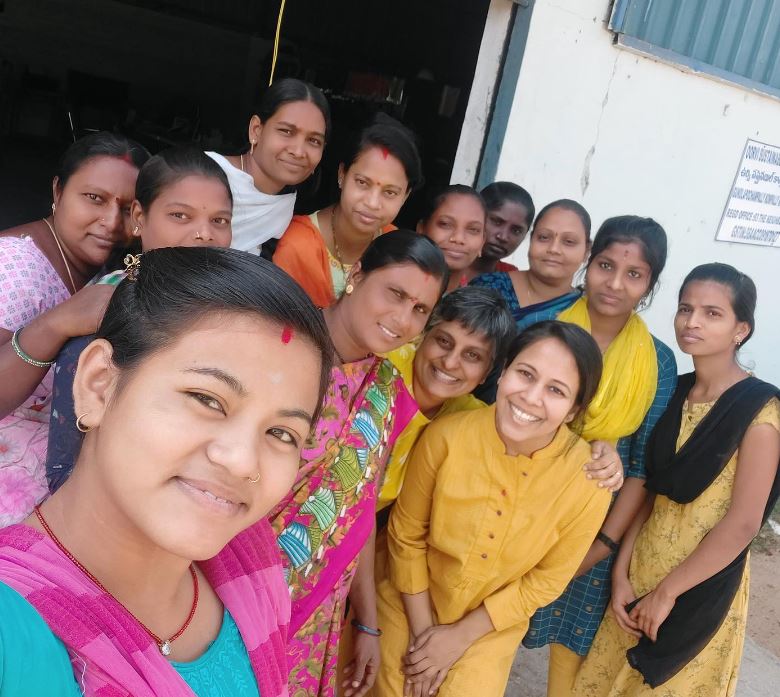(May 10, 2023) Maya Vivek and Minal Dalmia, two Telangana-based social entrepreneurs, tackle India’s flower waste pollution with their innovative startup, Oorvi Sustainable Concepts. By recycling flower waste into eco-friendly products, they not only contribute to sustainability but also provide employment for marginalized women.
“Every year, approximately eight million tons of waste flowers are dumped in the rivers in India, choking them to death. The pesticides and chemical fertilizers used to grow flowers mix with the river water, making it highly toxic,” states a report published by the International Journal for Research in Applied Science and Engineering Technology (IJRASET). “Various drains and waterways connected to the water bodies also get clogged, creating civic problems of great magnitude. We always tend to blame the industrial waste but never give a thought to flower pollution,” the report mentions.
The city of Hyderabad alone generates some 1,000 metric tons of flower waste per day, and Telangana-based social entrepreneurs Maya Vivek and Minal Dalmia decided to do something about it. They founded Oorvi Sustainable Concepts, which recycles flower waste collected from temples and social gatherings, and processes them into eco-friendly products like fertilisers, incense sticks and soaps. The social entrepreneurs are not just doing their bit for sustainability but also creating livelihoods for marginalised women in their locality. “We work with most beautiful things that nature has ever created – flowers and women,” says Maya, in an interview with Global Indian.
View this post on Instagram
It all began when…
Maya and Minal, who became friends while picking up their kids from school, had been toying with the idea of doing something for the marginalised women of their area, Gundlapochampally. While Minal was involved with her family business, Maya was thinking of a career switch, after spending two decades as an international logistics and freight forwarding professional. They wanted their next career move to be purposeful and of value to the local women.
As they brainstormed various ideas, they came across a video of Kanpur-based entrepreneurs who were recycling flowers and making a difference. The idea resonated with Maya and Minal, who decided to adopt the cause too. “We started our organisation in 2019. However, we had begun experimenting in 2018. Once we were ready with the prototypes, we went ahead and registered the firm,” tells Maya.
HolyWaste
They named their company ‘Oorvi’, or ‘earth’, and their products are made under the clever brand name, HolyWaste. They infuse new life into floral discards through a process they call ‘FloRejuvenation’.
“We wanted to get into a business where women and the environment could benefit together. Waste management was a huge area where we could explore possibilities and floral waste seemed niche, full of opportunity.” Mays says. “Any problem in the environment affects a woman’s life first. So, she is best suited to think of solutions too,” she adds.
View this post on Instagram
Slow and steady growth
Oorvi began operations with just one temple, setting up their first bin to collect used flowers at the Skandagiri temple in Secuderabad. They set up their processing unit in Gundlapochampally village, which is a half-hour drive from Hyderabad. Four years later, the organisation partners with more than 40 temples.
“A friend knew the head of Sri Subrahmanyaswamy Temple in Skandagiri, so the idea clicked,” says Maya. The sarpanch of Gundlapochampally was happy with their idea of benefitting local women. He helped them out by giving them access to the village community hall to start their initial operations.
This helped the duo win the trust of the local families and attract local women, who started joining their venture. The local women were trained in how to segregate and make eco-friendly products. Since the workers were mothers too, Maya and Minal made sure work hours were convenient – from 10 am to 4 pm every day. It allowed the women to devote themselves to work without worrying about neglecting their home and kids.
As the enterprise grew, Oorvi’s operations moved to a rented premise in the vicinity. The entrepreneurs have been partnering with places of worship, vendors, event planners, decorators, and just about anybody who generates floral waste.

Maya and Minal with few of the Oorvi workers
The extra mile
The entrepreneurs wanted HolyWaste products to be totally sustainable, down to their eco-friendly packaging. To avoid the use of plastic, the products are packed in pouches stitched from old and traditional handloom sarees and dupattas. To add a personal touch to their products, they attach handwritten notes on handmade paper with every package. “More than the products themselves, we found that people were fascinated with our process,” Maya smiles.
They made an impact quickly and IDEA, the startup incubator at the ICAR–National Academy of Agricultural Research Management, Hyderabad, took Oorvi under its wing, giving them the mentorship they needed. IDEA helped the HolyWaste project with the minutest of details, like getting just the right butter paper to lock the fragrance and freshness of the soaps and incense sticks to make the dream project successful.
Later, Maya and Minal’s startup was incubated by WE Hub (Women Entrepreneurs Hub), which is India’s first and only state-led incubator to promote and foster women entrepreneurship.
With dedication and the right mentorship Maya and Minal managed to find success despite starting operations just before the pandemic hit. They process over 1,000 kilograms of floral waste every week, preventing it from ending up in waterbodies and landfills.
The entrepreneurs were awarded the India Sustainability Award 2022. Their social venture was also honoured with the coveted Best Green Startup award in the Eco Ideas category at the prestigious Green India Awards, 2019.
“What is holy today is becoming waste tomorrow, so we should try to make it holy again,’ signs off Maya.

Ambar gift box by HolyWaste
Takeaways:
- Sustainability through innovation: Oorvi Sustainable Concepts demonstrates how identifying a niche environmental issue, like flower waste pollution, can lead to the development of innovative solutions and business opportunities.
- Vocal for local: The founders of Oorvi recognized the importance of empowering marginalized women, and their venture exemplifies how social entrepreneurship can create meaningful employment opportunities and improve local communities.
- Social empowerment and profitability: Oorvi’s commitment to sustainability, demonstrated by their eco-friendly packaging and products, serves as a reminder that businesses can have a positive impact on the environment while still being profitable.
- The social entrepreneurship landscape: The recognition and awards received by Oorvi, such as the India Sustainability Award and the Best Green Startup award, highlight the potential for social entrepreneurs to gain support and acknowledgement when addressing pressing environmental and social issues.
Follow Maya Vivek on LinkedIn
Follow HolyWaste on Instagram, Twitter, and Facebook




